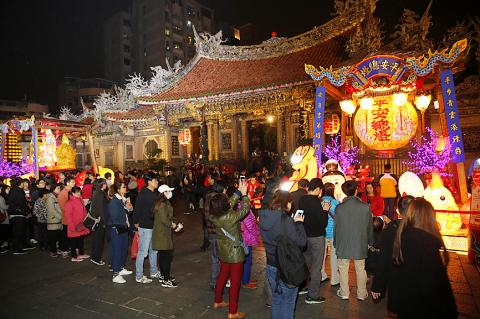Beijing yesterday announced that starting today it is suspending a program that allowed individual tourists from 47 Chinese cities to travel to Taiwan, citing the current state of relations between the two sides.
Chinese nationals may only travel to Taiwan as tourists if they are part of tour groups, the Chinese Ministry of Culture and Tourism said in a statement.
The ministry’s statement did not provide any further details as to the reason for the ban.

Photo: CNA
The unexpected move comes as China attempts to isolate Taiwan and President Tsai Ing-wen’s (蔡英文) administration.
Travel to Taiwan was opened to Chinese nationals in 2011, during former president Ma Ying-jeou’s (馬英九) administration.
The move might also be aimed at hurting Tsai’s re-election chances in the presidential election on Jan. 11 next year.
Chinese Ministry of Foreign Affairs spokeswoman Hua Chunying (華春瑩) declined to answer a question about the decision, asking reporters at a briefing in Beijing yesterday afternoon to talk to the relevant department for Taiwan affairs.
The Mainland Affairs Council issued a statement condemning the move, saying that cross-strait tourism is an important way of promoting better understanding.
It called on Beijing to discuss the issue with Taipei.
The Tourism Bureau said it regretted Beijing’s decision and hoped for a return to positive interaction with China.
“This is a shock to all of us. We are all very worried about it,” Taipei Association of Travel Agents chairman Benny Wu (吳志健) said by telephone. “This will have a huge impact on Taiwan’s tourism [industry] and economy.”
Spending by foreign tourists accounted for about 2.2 percent of GDP in 2017, the last year for which data is available, according to the bureau.
China was the largest single source of people visiting Taiwan and accounted for almost one-third of total visitors to the nation in May, according to a Bloomberg calculation based on data published by the bureau.
“As Taiwan is holding a presidential election soon, it’s not surprising that China is banning its citizens from visiting Taiwan,” KGI Securities Investment Advisory Co (凱基投顧) chairman Chu Yen-min (朱晏民) said.
“It seems to be a routine practice ahead of elections, as China doesn’t want its citizens to witness democracy,” Chu added. “The ban is expected to have a limited impact on Taiwan’s economy and stock market, as those hit are mostly not listed companies.”

SECURITY: As China is ‘reshaping’ Hong Kong’s population, Taiwan must raise the eligibility threshold for applications from Hong Kongers, Chiu Chui-cheng said When Hong Kong and Macau citizens apply for residency in Taiwan, it would be under a new category that includes a “national security observation period,” Mainland Affairs Council (MAC) Minister Chiu Chui-cheng (邱垂正) said yesterday. President William Lai (賴清德) on March 13 announced 17 strategies to counter China’s aggression toward Taiwan, including incorporating national security considerations into the review process for residency applications from Hong Kong and Macau citizens. The situation in Hong Kong is constantly changing, Chiu said to media yesterday on the sidelines of the Taipei Technology Run hosted by the Taipei Neihu Technology Park Development Association. With

A US Marine Corps regiment equipped with Naval Strike Missiles (NSM) is set to participate in the upcoming Balikatan 25 exercise in the Luzon Strait, marking the system’s first-ever deployment in the Philippines. US and Philippine officials have separately confirmed that the Navy Marine Expeditionary Ship Interdiction System (NMESIS) — the mobile launch platform for the Naval Strike Missile — would take part in the joint exercise. The missiles are being deployed to “a strategic first island chain chokepoint” in the waters between Taiwan proper and the Philippines, US-based Naval News reported. “The Luzon Strait and Bashi Channel represent a critical access

CARROT AND STICK: While unrelenting in its military threats, China attracted nearly 40,000 Taiwanese to over 400 business events last year Nearly 40,000 Taiwanese last year joined industry events in China, such as conferences and trade fairs, supported by the Chinese government, a study showed yesterday, as Beijing ramps up a charm offensive toward Taipei alongside military pressure. China has long taken a carrot-and-stick approach to Taiwan, threatening it with the prospect of military action while reaching out to those it believes are amenable to Beijing’s point of view. Taiwanese security officials are wary of what they see as Beijing’s influence campaigns to sway public opinion after Taipei and Beijing gradually resumed travel links halted by the COVID-19 pandemic, but the scale of

Pope Francis is be laid to rest on Saturday after lying in state for three days in St Peter’s Basilica, where the faithful are expected to flock to pay their respects to history’s first Latin American pontiff. The cardinals met yesterday in the Vatican’s synod hall to chart the next steps before a conclave begins to choose Francis’ successor, as condolences poured in from around the world. According to current norms, the conclave must begin between May 5 and 10. The cardinals set the funeral for Saturday at 10am in St Peter’s Square, to be celebrated by the dean of the College